DOLE Samar
provides labor education to academe workers
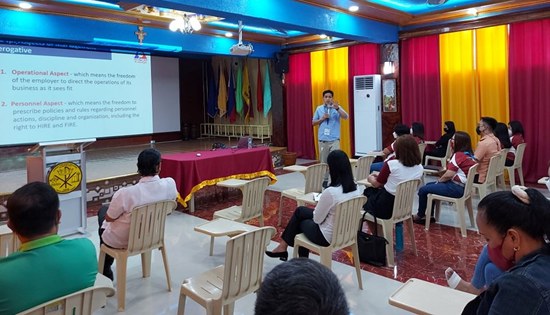
By
NORMA RAE S. COSTIMIANO
February 10, 2022
TACLOBAN CITY – The
Department of Labor and Employment Regional Office No. 8 through its
Samar Field Office (SFO) conducted a seminar on Labor Relations,
Human Relations and Productivity (LHP) for the management and
employees of Christ the King College in Calbayog City last February
2-3, 2022.
The two-day seminar was
attended by over 100 participants.
Mr. Demmie Jose Uyvico,
Senior Labor and Employment Officer and Mr. Raul Tabao, Labor and
Employment Officer III, tackled several important topics on Labor
Relations as well as General Labor Standards, Family Welfare Program
and the Batas Kasambahay.
School President, Fr.
Jovito Malinao, thanked the DOLE for imparting relevant information
through the conduct of LHP.
He said that the seminar
has indeed brought new learning not only on increasing productivity
but also on maintaining good and harmonious relations at their
workplace.
Mr. Uyvico, in behalf of
SFO Head Engr. Aleksei Ceasar Abellar expressed continued commitment
to provide necessary assistance through the Labor and Employment
Education Services (LEES).
“With this LHP seminar, we
hope we have provided the assistance you need. And it doesn’t end
here, because DOLE is always ready to serve its clients”, said
Uyvico.
LHP is one component of
the LEES program which aims to increase awareness on the rights and
responsibilities of workers and employers, work ethics, values and
skills to contribute in fostering a more cooperative
labor-management relations and attainment of decent and productive
work.
Other components of LEES
are Labor Education for Graduating Students (LEGS) and Continuing
Labor Education Seminar (CLES). (with a
report from DOLE-WLFO)
Angono, Calbayog
schools pursue art dreams despite pandemic, thanks to Rebisco

Press Release
February 9, 2022
QUEZON CITY –
Rebisco continues its support for young artists by providing art and
design essentials to two of its beneficiary schools, the Regional
Lead School for the Arts in Angono (RLSAA) in Rizal and the Calbayog
Arts and Design School of Eastern Visayas (CADSEV) in Samar.
Rebisco began to provide
RLSAA with paint brushes, easels, paints and other materials that
will support the needs of the art students in 2019. It also put up a
mini gallery on school grounds that was both classroom and
exhibition space for the students’ art work. In 2021, Rebisco added
CADSEV, known as “a Haven of Art in Eastern Visayas” as a
beneficiary school.
This year, Rebisco will
provide more basic art tools and materials as well as equipment for
mixed media and the performing arts to the two schools. The snacks
and biscuits company hopes that their artistically-inclined students
can continue to hone their innate skills in art and design and
embark on new creative adventures that will allow them to enrich the
Filipino art scene.
The Rebisco donations will
be a great help, said Ms. Rinalyn Beso, CADSEV School Head.
“Teaching the arts through distance learning can be very
challenging, but the instruments and art equipment will give every
learner the opportunity to be creative in the comfort of their homes
while being safe from Covid-19.”
“The new set of art
equipment will inspire and motivate our students to be more creative
and to pursue their passion. They can create more inspiring and
challenging artworks even as they deal with the challenge of remote
learning. We thank Rebisco for being our solid partner in honing the
talents and skills of our young artists. The art equipment will be
an inspiration, a source of joy and a morale booster for our young
artists,” said RLSAA Principal, Edgar Diñozo.
In support of the arts,
Rebisco also introduced to the market its Designer Tin Cans. The
designer cans, which change designs periodically, are mini versions
of the Rebisco Special Assorted Cans, the iconic, all-time favorite
pasalubong. Featured on the sides of the cans are the works of
famous contemporary artists and some students of RLSAA. Packed with
premium Rebisco biscuits, cookies, crackers and wafers, part of the
proceeds from the sales of the cans go to the support being given to
the schools.
The designer tin cans are
available at Rebisco Flagship Store on Lazada for those who want to
have artful keepsakes, enjoy yummy snacks and help boost art and
young artists in their own little way.
Free seaman’s
book for first-time applicants gains NMP’s support
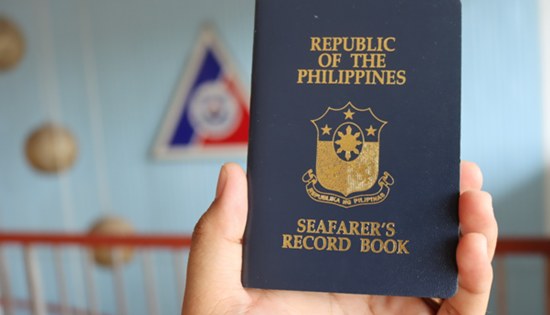
By
National Maritime Polytechnic
February 4, 2022
TACLOBAN CITY – The
National Maritime Polytechnic (NMP) affirms the approval of Maritime
Industry Authority (MARINA) Board on the free Seaman’s Book to be
issued to first time seafarer applicants, as well as the granting of
50% discount for its renewal.
As recently announced by
Transportation Secretary Arthur P. Tugade, the Seaman’s Book, which
cost ranges from Php1,000.00-Php1,800.00, will now be given for free
to seafarers who are applying for the first time during the term of
President Rodrigo Duterte, while the 50% off for the renewal will be
valid until December 2022.
In a statement, MARINA
Administrator Robert Empedrad explained that this initiative of the
MARINA and the Department of Transportation (DOTr) aims to support
the Filipino seafarers especially in the midst of the pandemic and
help lessen the expenses for the processing of their documents.
MARINA yearns to wholeheartedly fulfill the request of our
seafarer-heroes who remains steadfast to help boost our economy amid
the health crisis.
NMP Executive Director
Joel B. Maglunsod expresses full support to this cause as an
excellent way to help our seafarers and repay their valuable
contributions. As an advocate of the seafarers’ welfare, the NMP
will likewise explore other areas possible to pitch in and further
assist the department in the implementation.
The MARINA however is yet
to issue an official advisory for the guidelines and effectivity of
its implementation.
The Seaman’s Book,
technically referred to as Seafarer’s Record Book (SRB), is a full
record of a seafarer's career experience and certifications. It
certifies that the person holding it, is a Seafarer as per The
International Convention on Standards of Training, Certification and
Watchkeeping for Seafarers (STCW) and serves as record of sea
service of the holder.
Nearly 3 in every
10 families in Eastern Visayas are poor
By
PSA-8
February 2, 2022
TACLOBAN CITY –
Poverty incidence among families in Eastern Visayas in the first
semester of 2021 was estimated at 28.9 percent. This implies that in
the first semester of 2021, nearly 3 in every 10 families in the
region were poor or have income that were below the poverty
threshold, or the amount needed to buy their basic food and non-food
needs.
In the first semester of
2021, poverty incidence among families in Eastern Samar was
estimated at 36.0 percent; Leyte (excluding Tacloban City) at 31.3
percent; Samar at 30.0 percent; Southern Leyte at 25.5 percent;
Northern Samar at 23.1 percent; and Biliran at 22.4 percent.
Significant improvements
in poverty incidence among families between the first semester of
2018 and first semester of 2021 were noted in Eastern Samar and
Northern Samar. Poverty incidence among families in Eastern Samar
dropped to 36.0 percent in the first semester of 2021 from 43.0
percent in the first semester of 2018. The province of Northern
Samar, meanwhile, registered 23.1 percent poverty incidence among
families in the first semester of 2021, lower than the 30.0 percent
in the first semester of 2018. On the other hand, poverty incidence
among families in Biliran significantly increased to 22.4 percent in
the first semester of 2021 from 18.0 percent in the same semester of
2018 (Fig. 1).
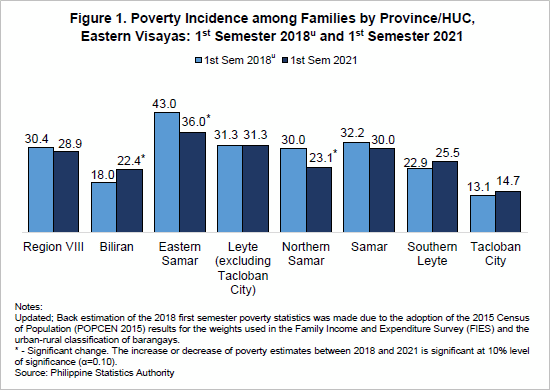
Given the new master
sample, PSA was able to generate reliable statistics down to the
provincial level as well as for highly urbanized cities (HUCs).
Poverty incidence among families for Tacloban City, the lone HUC in
the region, was recorded at 14.7 percent in the first semester of
2021.
36 out of 100 individuals
in Eastern Visayas are poor
Poverty incidence among
population in Eastern Visayas in the first semester of 2021 was
estimated at 36.0 percent. This implies that in the first semester
of 2021, 36 in every 100 individuals in the region belong to the
poor population whose incomes were not sufficient to buy their
minimum basic food and non-food needs.
In the first semester of
2021, poverty incidence among population in Eastern Samar was
estimated at 43.1 percent; Leyte (excluding Tacloban City) at 39.1
percent; Samar at 37.0 percent; Southern Leyte at 31.7 percent;
Northern Samar at 31.0 percent; and Biliran at 30.7 percent.
Significant improvements
in poverty incidence among population between the first semester of
2018 and first semester of 2021 were noted in Eastern Samar and
Northern Samar. Poverty incidence among population in Eastern Samar
dropped to 43.1 percent in the first semester of 2021 from 52.0
percent in the first semester of 2018. The province of Northern
Samar, meanwhile, registered 31.0 percent poverty incidence among
population in the first semester of 2021, lower than the 36.6
percent in the first semester of 2018. On the other hand, poverty
incidence among population in Biliran significantly increased to
30.7 percent in the first semester of 2021 from 24.9 percent in the
same semester of 2018 (Fig. 2).
Poverty incidence among
population in Tacloban City in the first semester of 2021 was
recorded at 20.1 percent.
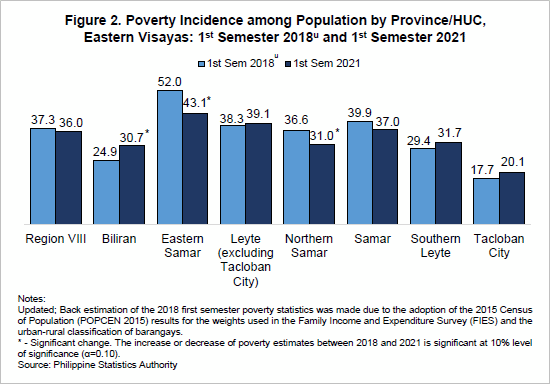
Subsistence Incidence
among Families
The subsistence incidence
among families in Eastern Visayas in the first semester of 2021 was
estimated at 13.2 percent. This means that in the first semester of
2021, about 13 in every 100 families in the region have incomes
below the food threshold or the amount needed to buy their basic
food needs and satisfy the nutritional requirements set by the Food
and Nutrition Research Institute (FNRI) to ensure that one remains
economically and socially productive.
In the first semester of
2021, subsistence incidence among families in Eastern Samar was
estimated at 18.7 percent; Leyte (excluding Tacloban City) at 16.0
percent; Samar at 11.7 percent; Southern Leyte at 10.4 percent;
Biliran at 8.7 percent; and Northern Samar at 7.1 percent.
Subsistence incidence
among families in Northern Samar significantly improved to 7.1
percent in the first semester of 2021 from 12.2 percent in the first
semester of 2018. On the other hand, subsistence incidence among
families in Biliran significantly increased to 8.7 percent in the
first semester of 2021 from 5.7 percent in the first semester of
2018. Southern Leyte registered 10.4 percent subsistence incidence
among families in the first semester of 2021, significantly higher
than the 7.9 percent in the first semester of 2018 (Fig. 3).
Subsistence incidence
among families in Tacloban City in the first semester of 2021 was
recorded at 5.3 percent.
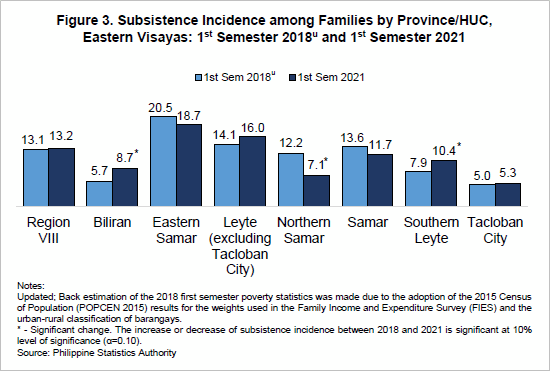
Subsistence Incidence
among Population
Subsistence incidence
among population in Eastern Visayas in the first semester of 2021
was estimated at 17.3 percent. This translates that in the first
semester of 2021, about 17 in every 100 individuals in the region
have incomes below the food threshold or the minimum amount needed
to buy their basic food needs.
In the first semester of
2021, subsistence incidence among population in Eastern Samar was
estimated at 24.6 percent; Leyte (excluding Tacloban City) at 21.1
percent; Samar at 15.4 percent; Southern Leyte at 13.9 percent;
Biliran at 13.1 percent; and Northern Samar at 10.6 percent.
Subsistence incidence
among population in Northern Samar significantly improved to 10.6
percent in the first semester of 2021 from 16.1 percent in the first
semester of 2018. On the other hand, subsistence incidence among
population in Biliran significantly increased to 13.1 percent in the
first semester of 2021 from 7.8 percent in the first semester of
2018. The province of Southern Leyte registered 13.9 percent
subsistence incidence among population in the first semester of
2021, significantly higher than the 10.3 percent in the first
semester of 2018 (Fig. 4).
Subsistence incidence
among population in Tacloban City in the first semester of 2021 was
recorded at 7.6 percent.
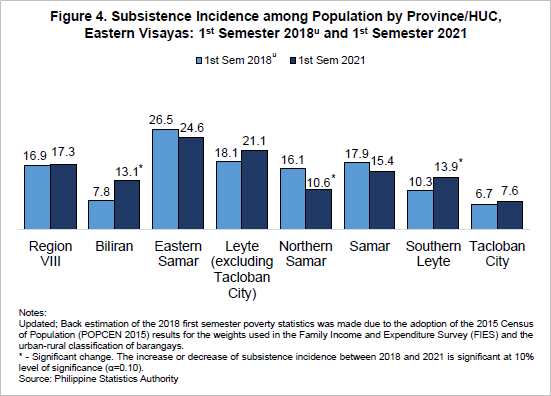
Food Threshold
In the first semester of
2021, a family of five in Eastern Visayas needed at least P7,904 per
month, to meet the family’s basic food needs. This amount represents
the average monthly food threshold for a family of five. This figure
is 11.2 percent higher compared with its first semester 2018 level
of P7,106.
In the first semester of
2021, the average monthly food threshold for a family of five in
Eastern Samar was estimated at P8,451; Southern Leyte at P8,445;
Biliran at P8,352; Leyte (excluding Tacloban City) at P7,835;
Northern Samar at P7,660; and Samar at P7,319.
Increases in food
threshold between the first semester 2018 and first semester 2021
were observed in all provinces. Biliran posted the biggest increase
in food threshold at 19.4 percent (Fig. 5).
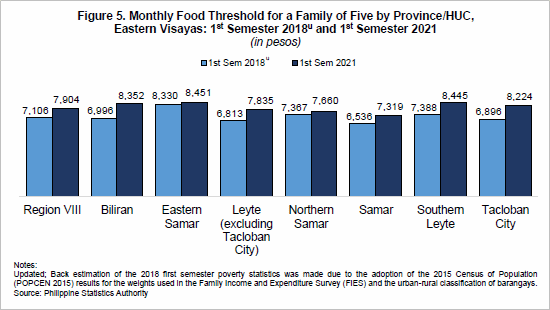
Meanwhile, average monthly
food threshold for a family of five in Tacloban City was estimated
at P8,224 in the first semester of 2021. This registered an increase
of 19.3 percent compared with its level in the same semester in
2018.
The average monthly
poverty threshold for a family of five in Eastern Visayas in the
first semester of 2021 was estimated at P11,292, an increase of 11.1
percent from its first semester 2018 level of P10,163. This
represents the amount needed every month to meet the family’s basic
food and non-food needs.
In the first semester of
2021, the average monthly poverty threshold for a family of five in
Eastern Samar was estimated at P12,103; Southern Leyte at P12,088;
Biliran at P11,957; Leyte (excluding Tacloban City) at P11,232;
Northern Samar at P10,977; and Samar at P10,494 (Fig. 6).
Increases in poverty
threshold between the first semester of 2018 and first semester of
2021 were observed in all provinces. Biliran posted the biggest
increase in poverty threshold at 19.2 percent.
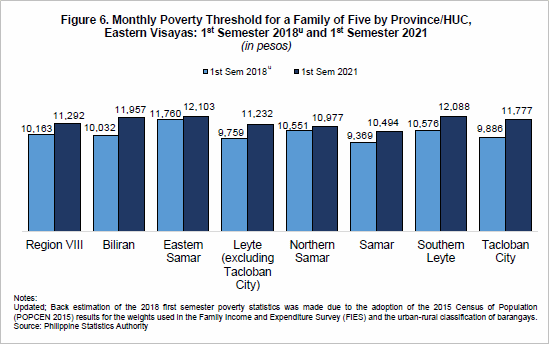
Meanwhile, average monthly
poverty threshold for a family of five in Tacloban City was
estimated at P11,777 in the first semester of 2021. This registered
an increase of 19.1 percent compared with its level in the same
semester in 2018.
Clustering of Provinces
based on Poverty Incidence
All provinces in the
country were clustered from 1 to 5 using poverty incidence among
families as the clustering variable. Cluster 1 comprises the bottom
poor provinces and cluster 5 comprises the least poor provinces.
In the first semester of
2021, two (2) provinces moved one (1) cluster lower from their
cluster category in the first semester of 2018, namely Leyte and
Biliran. The rest of the provinces maintained their first semester
2018 cluster categories.
Three (3) provinces:
Biliran, Northern Samar, and Southern Leyte belonged to cluster 3.
Meanwhile, Eastern Samar, Leyte (including Tacloban City) and Samar
were classified in cluster 2 (Table 6).
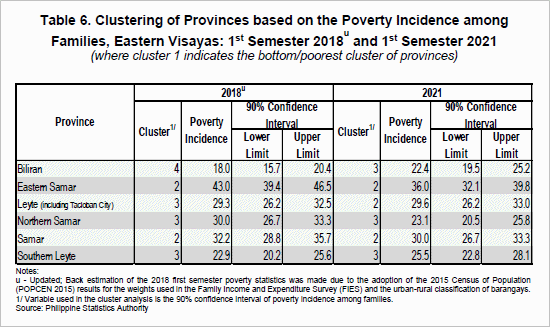
IT-BPM sector
urges Senate to ratify RCEP
By
DTI-IDTPG-Bureau of International Trade Relations
February 2, 2022
MANILA – The
Information Technology and Business Process Association of the
Philippines (IBPAP) called on the Senate to ratify the Regional
Comprehensive Economic Partnership (RCEP) agreement in a statement
released Thursday, 27 January 2022. IBPAP represents over 332
member-companies and six partner associations engaged in the
country’s business process outsourcing (BPO) industry and related
sectors.
According to Jack Madrid,
president of IBPAP, “We believe that RCEP will increase external
trade and spur more investments that create more livelihood and
other business opportunities in the country.”
He added that the stable
regulatory environment provided by RCEP would improve the
Philippines attractiveness to investors and accelerate the economy’s
recovery, stressing that the country had the potential to be a
manufacturing and services hub under the agreement.
“RCEP also promises
seamless production networks among the members who will be tied to
common standards, disciplines on intellectual property, rules of
origin, customs process, e-commerce and competition policy. With
stable and predictable rules, the Philippines could aspire to become
a regional manufacturing and services hub, thereby creating
much-needed domestic jobs. This framework will benefit the IT &
Business Process Management Industry by making the country a more
attractive investment destination and help expedite the economic
recovery from the pandemic by creating more job opportunities,” he
explained.
The RCEP Agreement is an
economic treaty brokered by the Association of Southeast Asian
Nations (ASEAN), of which the Philippines is a member, and its
dialogue partners – Australia, China, Japan, New Zealand, and South
Korea. It is estimated to be the largest trade bloc in the world,
representing 30% of the global GDP.
The RCEP Agreement was
signed by the ministers of 10 ASEAN Member States and 5 dialogue
partners last 15 November 2020. The Agreement took effect last 1
January 2022 for 10 Signatory States, for South Korea on 1 February
2022, and will be implemented by Malaysia on 18 March 2022.
The Agreement was ratified
by President Rodrigo Roa Duterte last 02 September 2021, with the
measure being deliberated in the Senate for concurrence.
MWSS, NCIP’s
railroading of Kaliwa Dam strengthens peoples’ unity
By
KATRIBU
January 31, 2022
MANILA – The
desperation of the Metropolitan Waterworks and Sewerage System (MWSS)
and National Commission on Indigenous Peoples (NCIP) to railroad the
Kaliwa Dam project strengthens the peoples’ unity against the said
destructive program.
IPs’ organizations, led by
Katribu Kalipunan ng Katutubong Mamamayan ng Pilipinas (KATRIBU),
IPs’ rights advocates, and defenders of the environment under
Network Opposed to Kaliwa, Kanan, and Laiban Dams (NO to KKLD)
protested in front of the MWSS’ office, January 31.
They opposed the
railroading of the Kaliwa Dam project and the recently concluded
week-long activity by the MWSS and NCIP in General Nakar, Quezon
province.
"MWSS and NCIP continue to
disrespect and neglect the non-consent decision of the majority of
the Dumagat people on the dam project. The manipulation of the FPIC
process also manifests MWSS and NCIP’s desperation to implement an
anti-people program," Rei Paulin, National Coordinator of KATRIBU,
said.
Paulin also added the need
for Metro Manila to address its water security issue. However, he
emphasized that the concern should not compromise the state of the
environment.
"We recognize the water
security problem in some parts of Luzon. Still, this matter should
not compromise the rights and welfare of Indigenous Peoples and the
status of our environment," Paulin added.
During the activity from
January 24-29, 2022, MWSS and NCIP conducted the anomalous MOA
validation of the Kaliwa Dam project amid Alert Level 3 due to the
pandemic.
The agencies barred the
Dumagat people from joining the discussion and negotiation for the
MOA signing and workshop on the Community Royalty Development Plan.
The Dumagat people said that the NCIP invited them to negotiate.
However, during the day of the negotiation, officials required them
to present negative Antigen Test Results. NCIP did not mention the
requirement in the invitation, according to the prohibited
individuals.
Rodrigo Piston, Indigenous
People Mandatory Representative from Lower Pagsangahan, General
Nakar, Quezon, denounced the local government of General Nakar,
Quezon, for allowing such activity amid the Alert Level 3 due to the
Coronavirus Disease 2019 (COVID-19). Members of the affected
community claim that such activity put them at risk amid the threat
of the COVID-19 virus.
“We are under Alert Level
3 due to the COVID-19. Still, the NCIP proceeded with the
negotiation. We, in General Nakar, condemned this activity amid the
pandemic. Individuals from other affected communities also opposed
the railroading of the program,” Piston said.
Meanwhile, the NCIP is
notorious for manipulating FPIC processes. In the case of the Kaliwa
Dam project, the commission selected “leaders” from the community to
join the MOA validation. Genuine FPIC requires genuine community
participation. The opposition of the affected communities to the
exclusivity of the MOA validation questions the process’ legitimacy.
Hence, NCIP’s selection of “leaders” for the process violates the
Dumagat people’s collective rights to self-determination.
Piston also condemned the
presence of members of the Philippine National Police during the
negotiation. He reiterated his community’s goals to protect the
environment and secure their ancestral lands from the destructive
state project.
“We are not criminals,
murderers, and thieves. We are expressing the truth and the impact
of the destructive Kaliwa Dam project to our children in the
future,” Piston added.
During the mobilization,
Kakay Tolentino, National Coordinator of Bai Indigenous Women’s
Network, supported the call of the Dumagat people in their struggle
for the protection of their fundamental rights.
“We stand in solidarity
with the Dumagats in opposing the implementation of the Kaliwa Dam
project. We call on the government to stop all destructive projects
across the country. Defend the rights of our IPS! Save our
environment!” Tolentino emphasized.
On the other hand, NO to
KKLD urged candidates for the 2022 May Elections to stand with the
Dumagat people in opposing the Kaliwa Dam project.
"We challenge all
candidates for the upcoming elections to join the struggle for the
protection of the environment, livelihood, and rights and welfare of
the Filipino people,” NO to KKLD said.
Southern Leyte
residents clamor for housing materials
|
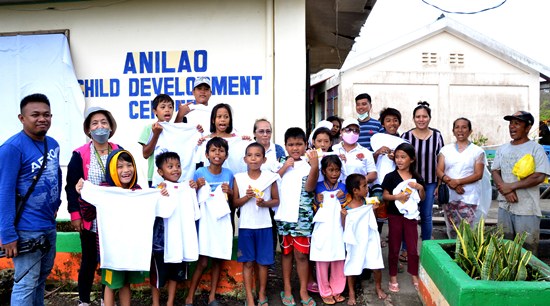
The
Department of Agrarian Reform (DAR) distributes shirts to
children at the Anilao Elementary School in Liloan, Southern
Leyte, which serves as evacuation center after Typhoon Odette
left many families homeless. (Jose Alsmith L. Soria) |
Press Release
January 28, 2022
LILOAN, Southern Leyte
– Members of agrarian reform beneficiaries organizations (ARBOs) in
the Panaon Island area are so grateful for the relief assistance
that keeps on pouring from various sectors.
In the afternoon of
December 16 last year, Super Typhoon Odette made its third landfall in
this town leaving many families homeless.
On January 5 of this year,
a team from the Department of Agrarian Reform (DAR), headed by Chief
of the Program Beneficiaries Development Division, Victoria Ligtas,
brought relief goods for the members of the Anilao Farmers
Association, San Roque Farmers Association, Pandan Farmers
Association, Himay-angan Rice Farmers Association and the Liloan
farmers Agricultural Cooperative.
Ligtas shared that they
have provided the member of the five ARBOs, who are all severely
affected by Typhoon Odette, with food items, drinking water,
garments and “trapal” (tarpaulin) to address their current needs.
The team likewise
distributed shirts and biscuits to children at the Anilao Elementary
School, which serves as evacuation center, where some agrarian
reform beneficiaries (ARBs) are taking refuge.
On December 29, 2021, the
same relief goods were received by the members of the Tuno Farmers
Multi-Purpose Cooperative and the Cangcasto Farmers Association,
Ligtas added.
Ligtas shared that more
than 400 ARBO members from the two municipalities, mostly ARBs, were
benefited. However, they are begging for housing materials to
rebuild their homes that were destroyed when the typhoon hit the
province nine days before Christmas.
ARB Ma. Nita Palabrica,
52, and a mother of three, appeals to those who are still planning
to bring relief assistance for the typhoon victims, “Sana financial
assistance na lang para makapagpatayo kami ng kahit kubo lang” (We
hope for financial assistance instead, so we could build even a
small house only.)
Palabrica’s family is
among those who are still staying in the evacuation center after
their houses were crashed down by the typhoon.
Markenn Jay Maloto, 25,
daughter of an agrarian reform beneficiary (ARB), when asked why she
was crying, said “Wala na kaming bahay. Di kami makatulog ng maayos.”
(We have no house anymore. We can’t sleep well.)
According to her, their
house was knocked down by a coconut tree. Now she, her parents, and
her younger brother, are crammed in one bed to sleep in a corner of
their broken house with a makeshift roof.
She appeals for housing
materials they would use in repairing their house.
Josefa Lupas, 72, was
lucky that she and her paralyzed ARB husband were able to evacuate
before the typhoon came but was dismayed when they returned the
following day to see their house, which stands along the seashore,
heavily damaged.
ARB Jenelyn Almojicar, 50,
chairperson of the Tuno Farmers Multi-Purpose Cooperative, exclaimed
“Salamat! Kahit sa kahirapan sa lugar na papunta dito, nakarating
ang taga-DAR at naalala kami” (Thank you! Even if it’s hard to come
here, people from DAR reached our place and remembered us.)
Almojicar is also asking
for materials they could use in repairing their organization’s
building which include a “sari-sari” store.
Just like what happened to
many houses all over the province, the roof of the said
organization’s building was blown away by strong winds, and
consequently, everything inside were damaged.
According to Almojicar,
members of their organization, who are all farmers, are dependent on
the store for their daily needs.
Meanwhile, DAR Eastern
Visayas Regional Director Robert Anthony Yu is looking for ways the
office could help the distraught ARBs recover and start a
livelihood.
Rep. Wild leads
call for action against Philippines human rights violations
Press release
January 28, 2022
WASHINGTON, D.C. –
This week, Representative Susan Wild (PA-07) led a bipartisan group
of her colleagues in sending a letter to Secretary of State Anthony
Blinken and Secretery of Treasury Janet Yellen, urging them to seek
targeted sanctions against members of the Duterte regime with
documented records of grave human rights violations in the
Philippines. Reports of widespread harassment and assassinations
have been observed by human rights groups, and the International
Criminal Court (ICC) has now begun a probe into possible crimes
against humanity during Philippine President Rodrigo Duterte’s
infamous so-called “war on drugs” – a pretext for an estimated
30,000 killings by security forces during the Duterte presidency.
"Those behind these
corrosive violations should no longer operate with impunity. In our
stand for democracy, the United States cannot overlook the crisis in
the Philippines, and we must take tangible action if we are to truly
stand for human rights and the flourishing of freedom around the
world," the lawmakers wrote. "To this end, we urge the imposition of
sanctions on individuals who are behind these major human rights
violations, particularly via the use of the Global Magnitsky Act."
In July, Rep. Wild
reintroduced the Philippine Human Rights Act, legislation to
reinforce American commitment to international human rights by
suspending security assistance to the Philippines until violence
against dissidents ceases and accountability against the
perpetrators commences.
This letter also arrives
alongside horrific reports detailing the rape of a 15-year-old girl,
Belle, by the 59th Infantry Brigade of the Philippine Army (IBPA)
under the leadership of Lt. General Antonio Parlade, who is among
the individuals listed in the letter as responsible for human rights
violations committed by the Philippine security forces under the
Duterte regime. Rep Wild stands with Belle and her family, who filed
charges against General Parlade and other officials this past week.
Rep. Wild was joined in
sending the letter by Reps. Brian Fitzpatrick (PA-01), Dean Phillips
(MN-03), Suzanne Bonamici (OR-01), Dina Titus (NV-01), Eleanor
Holmes Norton (DC), James McGovern (MA-03), Steve Cohen (TN-09),
Alexandria Ocasio-Cortez (NY-14), Jan Schakowsky (IL-09), Betty
McCollum (MN-04), Ted Lieu (CA-33), Andy Levin (MI-09), Anna Eshoo
(CA-18), Angie Craig (MN-02), Earl Blumenauer (OR-03), Chellie
Pingree (ME-01), Pramila Jayapal (WA-07), Barbara Lee (CA-13), Jim
Costa (CA-16), Ro Khanna (CA-17), Danny Davis (IL-07), Mark Pocan
(WI-02), Gerald Connolly (VA-11).
Read full text of the
letter here
NTF-ELCAC’s
red-tagging underscores urgency of passing bill on protection of
rights defenders - Karapatan
By
KARAPATAN
January 27, 2022
QUEZON CITY – The
National Task Force to End Local Communist Armed Conflict’s (NTF-ELCAC)
red-tagging of the authors of House Bill No. 10576 or the proposed
Human Rights Defenders Protection Act “only underscores the urgency
of passing the bill into law,” human rights alliance Karapatan
stated on Thursday, as it called on the Senate to pass Senate Bill
No. 179, the proposed measure’s counterpart bill, filed by Senator
Leila de Lima.
“The NTF-ELCAC and Badoy’s
unhinged and rabid red-tagging of the authors of the proposed Human
Rights Defenders Protection Act in the House of Representatives
should seriously alarm our senators to act with urgency. This is a
very clear reason why a law on protecting human rights defenders in
the country is long overdue, and why it should be passed without any
delay,” Karapatan Secretary General Cristina Palabay urged.
NTF-ELCAC spokesperson
Lorraine Badoy, in her statement last January 20, red-tagged the
authors of the proposed measure, as well as Karapatan and the
National Union of Peoples’ Lawyers, by claiming that it was authored
by “urban operatives” of the Communist Party of the Philippines, the
New People’s Army, and the National Democratic Front, and that, if
passed, “the bill will open the floodgates of abuse and torment on
our people by terrorists” and render the Anti-Terrorism Act
“ineffective and toothless.”
House Bill No. 10576 – a
consolidated version of House Bills No. 15 filed by Albay First
District Rep. Edcel Lagman, No. 161 filed by Quezon City Sixth
District Rep. Jose Christopher “Kit” Belmonte, and No. 240 filed by
the Makabayan bloc – was approved by the House of Representatives on
its third and final reading last January 17, 2022 with a total of
200 affirmative votes. No legislator voted against or abstained on
voting on the bill.
Palabay asserted that the
Badoy’s statement “clearly shows the NTF-ELCAC’s aversion to uphold
human rights in its militarist, fascist, and anti-people
counterinsurgency agenda; after all, the NTF-ELCAC is guilty of the
worst atrocities against human rights defenders from red-tagging,
judicial harassment, enforced disappearances, and extrajudicial
killings. Intentionally or not, she also exposes the true intent of
the terror law: the NTF-ELCAC wants to use it specifically to target
human rights defenders.”
“With or without the Human
Rights Defenders Protection Act, human rights defenders should not
be targeted by the government for their work. However, the specific
situation of human rights defenders and the NTF-ELCAC’s attacks
continue to put us – and each and every Filipino – in peril. It is
therefore urgent that the Human Rights Defenders Protection Act be
passed by the Senate along with the proposed measures to penalize
red-tagging,” the Karapatan official ended.